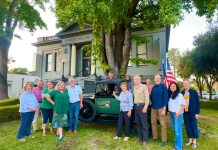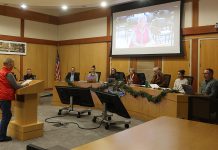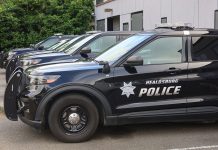Local nonprofit steps in to lead local chapter of the Health Action network
Local nonprofit Corazón Healdsburg has stepped in to lead the Healdsburg chapter of the county’s Health Action committee. There had been a previous chapter of Health Action in Healdsburg that had fallen by the wayside, but in 2016 several local members of the healthcare community started looking into reviving it.
“In 2016 Corazón was in the process of getting ready to launch and move forward publicly as a bilingual resource center and organization about bridging the racial divide in our community,” Ariel Kelley, board chair for Corazon Healdsburg said.
Concurrently, Terry Leach and David Anderson, along with Alliance Medical Center, had been convening a group of people to discuss relaunching the local Health Action chapter in Healdsburg.
“But, they were unsure about who was going to lead that effort,” Kelley said. “They knew it needed to happen but weren’t certain they had the time to commit to shepherding it through the approval process. (They knew) it was important, but they were not wanting to own it.”
Corazón agreed to take the lead on moving it through the process with the county, and during that process they met Leticia Romero, who at the time was helping to set up a Health Action chapter in Cloverdale.
“She had been convening a group of women, most of whom didn’t speak English, around what were the largest problems impacting their quality of life in Cloverdale and educating them and providing leadership development training so they could go speak to, say, the city manager and how to elevate their concerns up the chain,” Kelley said.
“We looked at what they were doing in Cloverdale and said ‘how do we achieve the community engagement you have accomplished?’ We have well-meaning, well-educated health professionals who want to improve the health of the community. How do we connect with residents who have already identified these bigger issues that lead to negative health outcomes if they aren’t addressed?” Kelley said.
Some months later, Alliance Medical told Corazón they wanted to provide funding for the Health Action chapter, and Romero was hired to steer the ship for Corazón and the newly formed chapter.
“The biggest concern from the county perspective when looking for chapters is for groups and organizations that are glued,” Kelley said. “That they have some infrastructure that will continue on in time.
“One of the things we soon realized was that the Health Action focus areas are pretty disparate. One is pure health, one is called cradle-to-career, which has a very different set of focus points and the third pillar is economic wellness,” Kelley continued. “It’s hard because they don’t have a lot to do with one another. You can bring in people focused on medical issues, education, financial things and they say why am I sitting in a meeting about preschool when I’m here about high blood pressure? They don’t seemingly have a lot of shared content at a granular level.”
But, copious research done by the county shows that in fact, education level, economic stability and safety of housing and opportunity are all factors with a tremendous impact on health outcomes.
The Healdsburg chapter of Health Action has four pillars in its plan. The first pillar is essentially traditional medical care. According to Kelley, for the last 18 months, a group of doctors and nurses who call themselves the BP Squad have been visiting Rotary, Kiwanis, the senior center and other events. The “squad” offers blood pressure screening, provides education about hypertension and gets people referred to appropriate care as needed. Other topics the group is preparing to cover include opioid use and tobacco policy around housing.
The second pillar has been somewhat modified from the county version, from cradle-to-career to cradle-to-college, and features a slightly different focus.
“Theirs (the county) is focused on students, ours is focused on students and their families,” Kelley said. “There is a program out of Aspen International called ASCEND, and it’s the foremost research institution around on how to end the recidivism of poverty and how to break the cycle of poverty. Their key outcomes say that you can’t just be focused on kids, it has to be a ‘dual gen’ approach with children and their parents, so this is what we’re doing.”
The programs for this pillar include the Moms to Moms baby shower and prenatal education program, as well as providing GED and ESL classes to parents, with childcare provided.
There is a working group focused on early childhood education that is interested in promoting preschool for all and recently held a preschool fair.
They have also promoted the use of the READY kindergarten preparedness data collection tool at both West Side and Alexander Valley schools (the system has already been in use at Healdsburg Elementary and Healdsburg Charter).
They have also implemented a “first gen” college prep program. To qualify, students must be on the free or reduced lunch program and have parents who have not graduated from college.
The third pillar is economic wellness, and includes a tax program from United Way that focuses on helping low income families obtain their earned income tax credit. “It launches next week, and we’ll be having a free tax prep site here in Healdsburg for the first time,” Kelley said.
There is also a Catholic Charities program that is focused on banking basics, like how and why to open a bank account and acquire credit. This links into an idea of helping families “prepare for housing,” by helping them be able to fill out applications and have possession of supporting documents.
“The new housing projects in Healdsburg, the Healdsburg Glen and the Citrine Apartments, are meant for low income residents, but a lot of residents who have never gone through a formal education process before, don’t know that in order to apply you have to have pay stubs, your tax returns, letters of recommendation, credit,” Kelley said.
“This is a normal application and screening process, but the people we serve have never had to go through that type of rigorous process before,” she added. “They might not have credit or money saved for a deposit. Those are the barriers we are working to get out in front of.”
The final pillar in Healdsburg’s plan is food access, one that is not part of the county’s framework. When Romero stepped in to lead the program, she suggested a door-to-door survey be conducted to assess the needs of the community.
“Through that early survey process we identified that food access and security was an issue. Out of that survey process came the info that housing was the number one issue, but number two was access to food, which was a huge surprise. Everyone in the positions of power assumed that transportation would be number two. From that, we started the food access working group,” Romero said.
Ultimately, what will make these pillars and working groups successful is the ability to get people and groups who share similar goals, in the same room. “As a chapter we meet quarterly at the county level to report what is happening in our working groups and that’s how we keep the glue loosely wrapped around this thing, and meet more regularly with the working groups,” Kelley said.
“Healdsburg is the land of a thousand nonprofits, and, for example, we were starting to go down the path of increasing access to preschool for low income families, and we realized that AAUW’s Healdsburg chapter had already been doing an assessment around preschool opportunities. We invited those participants to join this committee and then we invited people from the local preschools and First Five to all get in a room. Out of that came the preschool fair and showed that it’s a way to bring different organizations that have same goals to a more interactive conversation around improving these outcomes.”
Incumbent in these plans is the cooperation of and partnership with the city of Healdsburg. City councilmember Leah Gold currently serves as the liaison to the Health Action chapter with councilmember Joe Naujokas as the alternate.
“Corazòn has a track record of bringing the community together and advocating for residents who are less able to advocate for themselves,” said Gold. “The council is eager to support their goals. I’m pleased by the synergy of their service agreement with the city and their partnership with Health Action. They will be able to advise us about policies to make Healdsburg a healthier place to grow up and to live.”
Anyone interested in becoming a volunteer for Corazón Healdsburg’s Health Action chapter is asked to either sign up as a volunteer through their website at corazonhealdsburg.org or email with questions to in**@***************rg.org.









